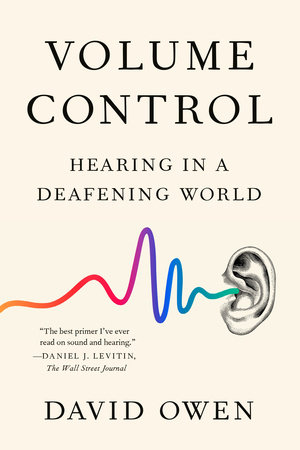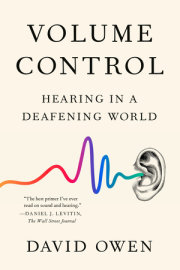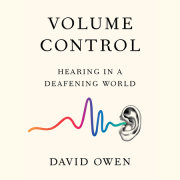“[Volume Control] is the best primer I’ve ever read on sound and hearing, and full of advice for people of any age to consider. . . . [Owen] gives us a wonderful insight into the world of the hard of hearing and deaf.” —Wall Street Journal
“An informative, sympathetic and eye-opening book.” —AARP
“Informative and entertaining. . . . In clear, appealing prose, Owen explains how loud sounds—machinery, live music, etc.—can leave people no longer noticing smoke alarms, sirens, gunshots, and backup signals. . . he makes earwax interesting. . . . The book brims with useful advice.” —Kirkus Reviews (starred review)
“Owen's writing and thinking about the nature of ears, sounds, and communication are lively. . . . Volume Control will remain relevant for decades to come.” —Pacific Standard
“Timely and informative. . . . This well-researched and accessible introduction to the complicated subject of hearing loss is highly recommended for all science readers, not just those experiencing hearing impairments.” —Library Journal (starred review)
“Accessible and surprisingly entertaining. . . this work addresses an important issue for the growing pool of aging baby boomers.” —Booklist
“Owen, a New Yorker staff writer, wrestles with the complexities of the human ear in this informative…illuminating account of human hearing.” —Publishers Weekly
“In Volume Control David Owen brings his superb skills as a reporter and storyteller to the increasingly urgent issue of hearing loss. The baby-boomers are aging—and so are their ears. Fortunately, and probably because of this demographic trend, both science and commerce are at last paying attention to this invisible but epidemic problem. Owen is an erudite and entertaining guide not only to the new technologies that make hearing aids better and more affordable, but to the myriad byways and curiosities he encounters in his research.” —Katherine Bouton, author of Smart Hearing and Shouting Won't Help
“David Owen aptly addresses the medical, emotional, and social aspects of hearing loss, along with some surprising revelations about technology and hearing aids. He presents the latest information in a way that makes you want to keep reading.” —Barbara Kelley, executive director, Hearing Loss Association of America
“As this book makes clear, most of us will encounter hearing loss at some point in our lives;, we all stand to gain from reading Volume Control for practical reasons alone. But David Owen brims with a curiosity that's beautifully matched by his journalistic alacrity. How many times I beamed with sheer delight simply to follow the author down one fascinating path after another.” —Leah Hager Cohen, author of Strangers and Cousins
“A wide-ranging exploration of our vital sense of hearing, and the consequences when it wanes. Owen makes accessible not only the fascinating biology of hearing, but the complexities of remedying its loss.” —Jerome Groopman, Dina and Raphael Recanati Professor of Medicine at Harvard Medical School and author of The Anatomy of Hope








